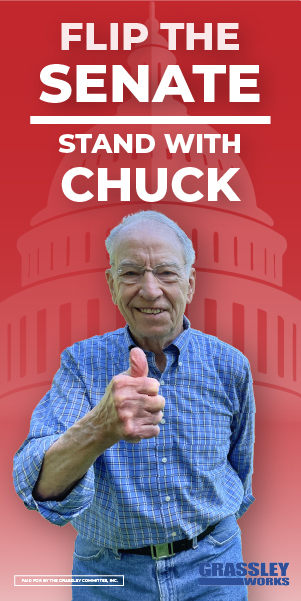Senator Joni Ernst endorsed Senator Chuck Grassley’s prescription drug pricing reduction act today. The legislation formally called the Prescription Drug Pricing Reduction Act, is a bipartisan effort headed by both Senator Grassley and Senator Ron Wyden (D-Ore.).
At nearly every town hall or other stop I make on my 99 County Tour, and even in discussions around the kitchen table with my family members who depend on life-saving medications, Iowans from every corner of the state have made it clear that they want to see Congress address the skyrocketing cost of prescription drugs. This issue is a top priority for me and it’s why I’ve been working across the aisle on a number of proposals. While we’ve made some progress, there’s more work to do,” said Senator Joni Ernst. “We need to take a hard look at all the proposals on the table and come together to find solutions. I’m working toward that end, and I hope many more will join me.
The Grassley-Wyden bill has garnered broad praise. Recently in his state of a union address, President Donald Trump endorsed the legislation. Vice President Mike Pence also expressed his support. Last week Sen. Martha McSally (R-Ariz.) endorsed Grassley’s bill.
At a recent town hall in Coralville, Grassley talked about the goals of the legislation. “The Prescription Drug Pricing Reduction Act takes a commonsense approach by keeping what works and improving what doesn’t.” he said.
It increases the incentives for prescription drug plans and drug companies to negotiate the lowest prices. It requires drug companies that increase their price above inflation to rebate the difference back to Medicare.
Grassley maintains that it would make Medicare more sustainable and would protect taxpayers as well as patients from price gouging. The legislation would also place a cap on out-of-pocket costs for beneficiaries.
The Senator noted that the bill “doesn’t set the price for a drug or dictate what it can charge.”
The bill has some detractors. Critics have charged that the proposed legislation would amount to price controls and lead to less drug innovation.
However, on February 14th, Alex Azar, the United States Secretary of Health and Human Services, disputed this claim in the Senate Finance Committee hearing. During the hearing, Azar declared, “I fundamentally disagree with the notion that the inflation penalty provisions that are in the Grassley-Wyden bill constitute price caps or price controls.”
Azar was formerly the head of Eli Lilly and Company, a major pharmaceutical drug company. When asked if drug companies can continue to innovate under the Grassley’s Bill Azar said, “Oh, absolutely. The changes here still leave plenty of room for profit-margin innovation and investment. There would be no material impact in any way to the R&D enterprise in the United States, which we are all committed to.”
A portion of his testimony is below.
This isn’t the first time that Ernst and Grassley have collaborated on legislation regarding pharmaceuticals. In 2019, they worked together to pass the Grassley – Lahey CREATES ACT. That legislation deters pharmaceutical companies from blocking cheaper generic alternatives from being able to enter the marketplace, thereby removing obstacles to lower-cost prescription drugs. The Congressional Budget Office estimated that the bill would result in a 3.7 billion dollar net decrease in the federal deficit over ten years.



